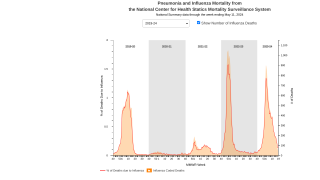Did Vaccine Mandates Decrease Flu Shots by 19%

Once thriving, the influenza vaccine business in the United States is on a dramatic downward trend. Only 157 million flu shots have been distributed so far during the 2023-2024 flu season.
This data indicates a 19% decrease for the 2020-2021 season when 194 million flu shots were distributed.
With the influenza vaccine's efficacy hovering around 50%, the protective benefits people receive cannot be the reason behind this sudden, negative trend.
A study published on February 15, 2024, suggests that restrictions in the form of vaccination mandates can have unintended negative consequences.
Using population-level epidemiological data from the U.S. Centers for Disease Control and Prevention (CDC), these researchers analyzed the impact of state-level COVID-19 mandates on vaccination behavior.
Controlling for the proportion of people in a state who received a COVID-19 vaccine, adults in states with mandates were less likely to report receiving the seasonal flu vaccine than adults in states where COVID-19 vaccination requirements were banned (b = −0.12, 95% CI [−0.16, −0.08].
This finding replicated among children (b = −0.18, 95% CI [−0.23, −0.12]), where an interaction between state legislation type and COVID-19 vaccination rates was also observed (b = 0.15, 95% CI [0.04, 0.27]).
The study's results highlight that mandates may decrease the adoption of voluntary vaccines, such as flu shots.
The researchers from the University of Arizona at Tucson and Furman University wrote, "These findings provide evidence to support the concerns of scholars and practitioners that selective vaccination mandates can have harmful, or at least have unintended consequences for public health, which need consideration when creating such policies."
"It's time for us to start thinking critically about the effectiveness of vaccination mandates and their impact on the healthcare system."
As the current flu season fades, the CDC encourages people 'at risk' for respiratory viruses to remain vigilant and speak with a healthcare provider regarding booster options.
Various influenza vaccines, cell, egg, and nasal-based, remain available at most pharmacies in the U.S.
Notes: Data for this project were aggregated from several sources, including the CDC, COVID States Project, Ballotpedia, and the U.S. Census. No funding source was reported, and the study authors declared no competing interest.
Our Trust Standards: Medical Advisory Committee
























